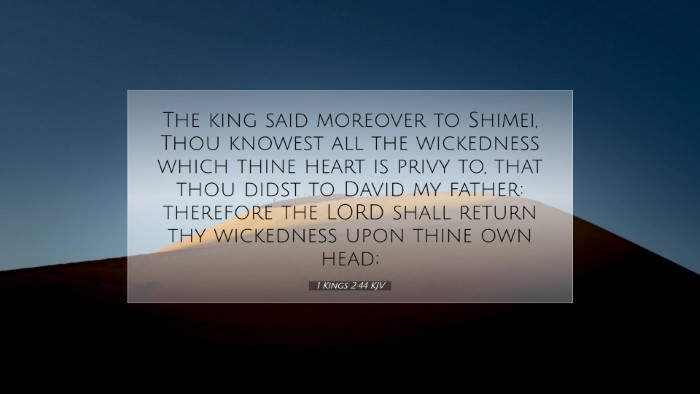Commentary on 1 Kings 2:44
Verse Text: "The king said moreover to Shimei, 'You know all the wickedness which your heart is privy to, and you did to David my father. Therefore the Lord shall return your wickedness upon your own head.'" (1 Kings 2:44, NKJV)
Contextual Background
This verse falls within the transition of leadership from King David to his son Solomon. David, at the end of his reign, is concerned about the legacy and stability of the kingdom. He instructs Solomon regarding Shimei, who had once cursed and insulted David during Absalom's rebellion. David's instructions to Solomon serve as both a warning and an important reminder of the interplay between justice, mercy, and divine retribution.
Thematic Insights
The themes embedded in this verse highlight the nature of retribution, the weight of personal accountability before God, and the careful governance of power. Commentators emphasize that this moment is pivotal in the narrative of Solomon's ascension to the throne and sets a precedent for his reign.
Retribution and Justice
Albert Barnes highlights the concept of divine justice at play when he notes that Shimei's actions have not gone unnoticed by God. The statement 'the Lord shall return your wickedness upon your own head' echoes the biblical principle of sowing and reaping (Galatians 6:7). This serves as a warning to all who commit evil deeds, reinforcing the belief that God will ultimately hold individuals accountable for their actions.
Political Wisdom
Matthew Henry emphasizes the political dimension of Solomon's decision-making. He suggests that this moment reflects Solomon’s effort to consolidate power and eliminate threats to his reign. Shimei's potential to stir dissent necessitates careful handling; therefore, Solomon's approach is one of strategic caution. By confronting Shimei, Solomon is not merely punishing a personal enemy but also demonstrating his authority as king.
The Nature of Mercy and Forgiveness
Adam Clarke explores the duality present in Solomon’s command. While there is a call for justice regarding Shimei’s actions against David, Clarke also underscores the potential for mercy. Shimei had previously been allowed to live under a conditional promise, and his violation of that promise demonstrates a failure both to trust and to heed wise counsel. Thus, Clarke brings attention to the importance of recognizing the balance between mercy and justice in leadership.
Lessons for Leaders
Leaders, both within the church and secular authority, can derive several lessons from this verse:
- Accountability: Leaders must recognize that their actions carry weight and have implications for the community they serve.
- Justice vs. Mercy: Effective governance requires a wise balance of justice and mercy. Leaders should strive to be fair but must also be discerning in their decisions.
- Vigilance Against Threats: Leaders should be vigilant regarding those who may oppose their authority or seek to undermine stability.
Conclusion
1 Kings 2:44 encapsulates significant themes of retribution, political wisdom, and moral accountability. As Solomon addresses Shimei, the verse serves as a critical reminder of the responsibilities that accompany authority. The reflections offered by various commentators illuminate the rich theological and moral dimensions of this text, offering valuable insights for pastors, students, and theologians alike.


